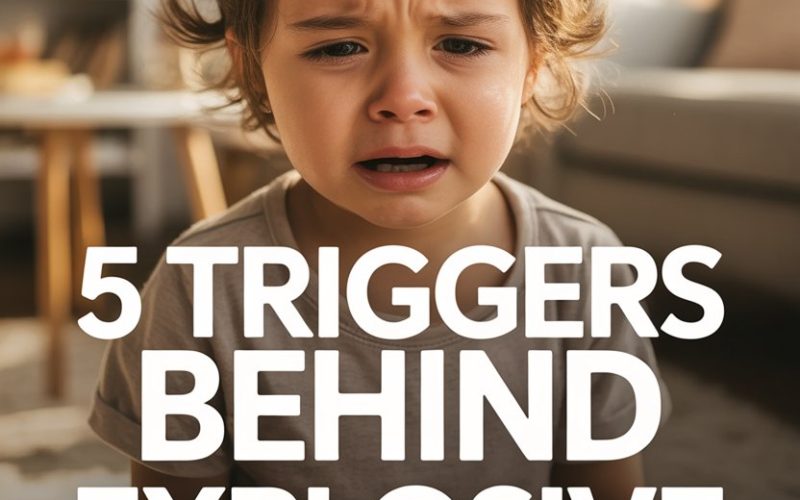Every parent has that story: a child who transformed from adorable cherub to purple-faced banshee in less time than it takes to microwave peas.
You’re left clutching your coffee, wondering which ancient emotion gods you’ve offended.
Good news: you’re not alone. Even the most angelic child on the school run has a hidden talent for detonation.
While each kiddo’s fuse is unique, the most common triggers tend to pop up again and again. The trick is learning to spot them—and maybe, just maybe, sidestep a few meltdowns along the way.
1. Fatigue and Hunger: The Classic Double Whammy
Ever tried reasoning with a hungry, overtired child? It’s like negotiating with a very loud, very short human tornado.
And for good reason. Exhaustion and low blood sugar are emotional nitroglycerin.
Research from the Sleep Foundation highlights that children require more sleep than most parents think.
A missed nap or a late bedtime can prime the emotional pump. Chuck in a skipped snack and you’ve got all the ingredients for an Oscar-worthy tantrum.
How can parents outsmart this classic one-two punch? Keep snacks handy (the squishier and more crumb-resistant, the better). Try to stick to a regular sleep routine, even if it means leaving Auntie Linda’s birthday party a bit early.
And if your child’s eyelids start drooping right before the supermarket checkout, brace yourself—a meltdown may be as inevitable as the impulse chocolate purchase.
2. Overstimulation: When the World Gets Too Loud
There’s a reason adults retreat to the loo for peace and quiet. Kids, unfortunately, don’t always have that option—or the words to explain that the world just feels too much right now.
Birthday parties, shopping malls, even a particularly boisterous family dinner can flood a child’s senses.
Noisy rooms, bright lights, and crowds can make little brains hit the panic button. Sometimes the only way out is through a spectacular emotional eruption.
Experts like Dr. Laura Markham note that sensitive children are especially prone to sensory overload. Watch for early warning signs: covering ears, hiding under tables, or suddenly needing cuddles in the middle of the action.
What helps? Create a “calm-down” kit or a safe spot at home with soft pillows and favourite books. If you’re out and about, a quick walk outside or a quiet corner can work wonders.
If nothing else, a good cuddle—preferably somewhere you won’t accidentally squash a cupcake—can help your child’s system reboot.
3. Big Transitions and Unpredictable Changes
Children love routine. It’s why they’ll eat the same sandwich for lunch every day for a year and then, without warning, declare war on ham.
When routines get disrupted—new babysitter, moving house, a different toothpaste—it can trigger emotional eruptions that leave everyone reeling.
Even seemingly small changes, like a parent working late, can feel seismic from a child’s perspective.
According to Harvard’s Center on the Developing Child, predictability helps children feel secure and in control. When things shift unexpectedly, that sense of security flies right out of the pram.
To help, offer plenty of warnings before changes. “In five minutes, it’s bath time” goes down easier than “Bath! Now!” Visual timers or picture schedules work wonders, especially for younger children or those who struggle with transitions.
When big changes are coming (starting school, moving house, new sibling), talk about them early and often, using storybooks or play to make things less intimidating.
4. Unmet Needs for Connection and Attention
Ever notice how your child’s most dramatic performances crop up precisely when you’re elbow-deep in dinner prep or glued to a work call? Spoiler: sometimes, explosive emotions are desperate attempts to connect.
Psychologists like Dr. Daniel Siegel point out that attention isn’t a luxury for kids—it’s a biological need.
When children feel disconnected (even if you’re sitting right there, but mentally writing your shopping list), they’ll up the ante until you can’t ignore them.
Cue: tears, shouts, flailing arms, and the occasional dramatic flop onto the carpet.
The antidote? Short bursts of undivided attention.
Even five minutes of “special time” can fill up a child’s connection bucket. Try a silly dance-off while the kettle boils, or let them “help” with dinner, even if it means the carrots come out more diced than sliced.
If you need to focus on something else, let them know exactly when you’ll be available—“I need five minutes to finish this email, then I’m all yours.”
Turns out, a little bit of connection goes a surprisingly long way.
5. Big, Unnamed Feelings and Frustration
Ask a five-year-old to explain why they’re howling, and you’ll often get a mystifying answer. “My sock feels funny.” “The wind looked at me.”
Sometimes, there’s no logical thread—just tidal waves of emotion they can’t quite name.
Kids don’t yet have the vocabulary or self-awareness to say, “Actually, I’m feeling overwhelmed and disappointed that my Lego tower keeps falling.” Instead, you get tears, shrieks, and possibly a flying shoe.
Emotion coaching, as described by research from the Gottman Institute, teaches children to notice, name, and manage their feelings. This doesn’t mean launching into a TED Talk mid-tantrum.
Try putting words to what you see: “You’re feeling really cross because your picture got smudged,” or “It’s hard when things don’t go your way.”
Don’t rush to “fix” the feeling. Sometimes, kids just need permission to feel rotten for a bit without being shushed or distracted.
Offer a hug, sit nearby, and wait for the emotional storm to pass. You’ll often find the tears dry up faster once a child feels understood.
When Emotions Run High (and the Dog Hides Under the Table)
Coping with explosive kid emotions is no one’s idea of fun. Still, beneath every tantrum or tearful howl sits a need your child can’t quite put into words.
Tune in to the triggers—hunger, tiredness, overload, unexpected change, lack of connection, or simply big feelings with nowhere to go—and you’ll start spotting patterns faster than you can say “where did all the clean socks go?”
You won’t dodge every meltdown. That’s not the goal.
Some days, it’s about surviving the emotional weather with your relationship intact and your sense of humour (mostly) unscathed.
The good news? With a bit of insight and a pinch of patience, you and your child can weather the storm and find the sunshine on the other side.
Even if it means eating toast for dinner and stepping on a stray piece of Lego along the way.




